What's new

Building capacity in the settlement service sector to promote OHS awareness among newcomers
Newcomers to Canada are at increased risk of workplace injury and illness, due in part to a lack of knowledge about their rights and responsibilities in occupational health and safety (OHS). IWH was recently involved in a project focused on supporting settlement agencies to promote OHS awareness among newcomers. In an upcoming IWH Speaker Series presentation, IWH's Dr. Basak Yanar joins Eduardo Huesca of Occupational Health Clinics for Ontario Workers (OHCOW) to talk about OHS capacity-building workshops for settlement agencies. They also discuss opportunities for Ontario’s OHS system partners to further support the settlement sector.

Comparing employment patterns of older workers in four countries
In many developed countries, including Canada, encouraging older workers to stay in the workforce is a common policy goal. But what do we know about current work participation patterns among people aged 65 to 75? A new study involving IWH looks at data in Canada, the United Kingdom, Denmark and Sweden.
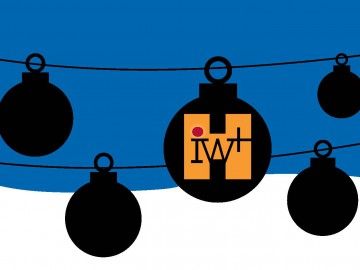
Season's Greetings from all of us at IWH
The holidays are upon us. We at the Institute for Work & Health (IWH) wish you all the best of the season. May your holidays be restful, joyful and safe. Thank you for your support in 2019. Let’s resolve to continue working towards greater worker protection in the new year.

Claimants’ perceptions of fair treatment linked to lower odds of mental illness
Previous studies have suggested that the process of making a workers’ compensation claim is linked with poorer mental health. A new study by IWH examines the contribution of one aspect of the process: the interactions between injured workers and case managers. As summed up in At Work, the findings of this study drive home the importance of treating claimants respectfully and giving them the information they need.

World Congress 2020 extends deadline for presentation proposals
Do you have successes to share or insights to explore with others in the global occupational health and safety community? Submit your proposal to present your strategic solutions, research findings or industry innovations at the XXII World Congress on Safety and Health at Work. The deadline for submissions has been extended to January 15, 2020. World Congress 2020, co-hosted by IWH and the Canadian Centre for Occupational Health and Safety, takes place in Toronto, October 4-7.

IWH 2018-19 annual report highlights what research can do
What can IWH research do? It can point to injuries and illnesses emerging in today’s working environment. It can find new solutions and best practices to prevent work injuries and disabilities. It can evaluate the effectiveness of system-level health, safety and disability prevention policies and programs. Our 2018-19 annual report, now out, highlights examples of IWH work during the year ending March 31, 2019, that did just this.
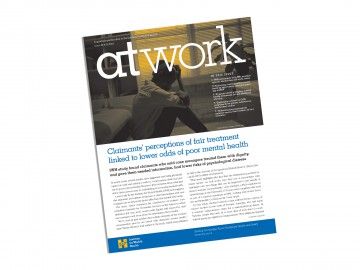
At Work Fall 2019 is now out
The Fall 2019 issue of At Work is now "on the stands." In the issue, learn how claimants' perceptions about fair treatment by case managers are linked to their odds of experiencing poor mental health. Read about the workplace roles that most commonly experience communication problems around return to work. Find out the link between COR certification and injury rates. And more...

What research can do: IWH researchers help MPs examine episodic disabilities and work issues
IWH senior scientists presented expert testimony to a federal standing committee looking at the needs of people with episodic disabilities—an example of how research can support policy-makers in addressing important societal issues.

IWH’s Dr. Monique Gignac recognized for arthritis-related research service work
Congratulations to IWH Senior Scientist and Scientific Co-Director Dr. Monique Gignac. In early November, the American College of Rheumatology/Association of Rheumatology Professions (ARP) named her a recipient of one of its 2019 service awards. The ARP Addie Thomas award recognizes an association member who has been an active volunteer involved with local, regional, national and/or international arthritis-related activities.

Proposed new CSA standard on work disability management now open for feedback
Currently, no national or international standard is available to help Canadian employers achieve excellence in their work disability management systems. A research team, which includes IWH Senior Scientist and Centre for Research on Work Disability Policy (CRWDP) Director Dr. Emile Tompa, has been working with the CSA Group to change that. A new proposed standard on work disability prevention management systems—the CSA Z1011 standard—is now available for public review and comment. The deadline for feedback is December 8.

Supervisors and case managers report more RTW communication bottlenecks: study
Disability management depends on good communication. In large and complex organizations, communication breakdowns about return to work (RTW) tend to concentrate around two key roles: front-line supervisors and case managers. That’s according to an IWH study of communication bottlenecks in disability management.
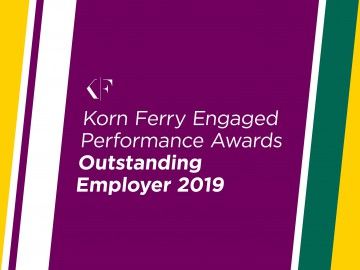
IWH honoured with Korn Ferry employee engagement award
The Institute has been honoured with a 2019 Korn Ferry Engaged Performance Award. The award recognizes 71 organizations from around the world that score high in two categories—engagement and enablement—in the consulting firm’s employee surveys. Winning organizations are chosen based on employee responses to four statements: “I feel proud to work for the company,” “I would recommend the company as a good place to work,” “My job makes good use of my skills and abilities” and “Conditions in my job allow me to be as productive as I can be.”

IWH Updates - Fall 2019
Korn Ferry recognizes IWH for workforce engagement and enablement ~ Dr. Monique Gignac receives in rheumatology professional association service award ~ IWH makes changes to executive team ~ New website launched on episodic conditions

IWH Speaker Series: Estimating the value of OHS in five European countries
Estimates of the economic burden of work-related injuries and illnesses help policy-makers and other stakeholders in occupational health and safety (OHS) set priorities. In a recent European Agency for Safety and Health at Work project, IWH Senior Scientist Dr. Emile Tompa led a team to compile such estimates for five European Union countries: Germany, Poland, Finland, The Netherlands and Italy. On November 12, he shares findings and discusses the methods used—methods that can serve as a template for economic burden estimates elsewhere.
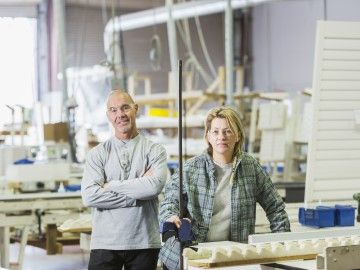
When do older workers with chronic conditions plan to retire?
Having a health condition or a chronic disease can be challenging for older workers, but it doesn’t necessarily decrease their intention to work or hasten their retirement. According to an IWH study on retirement expectations, with appropriate policies and practices, older workers with health limitations can be supported to remain active in the labour force.
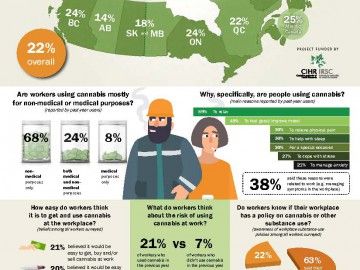
What were Canadian workers thinking about cannabis use before legalization?
One year ago today, non-medical cannabis was legalized in Canada. Four months before legalization, researchers from the Institute for Work & Health surveyed workers across Canada to find out about their use of, and beliefs about, cannabis at work. These researchers are surveying this same group of workers (and more) for three years post-legalization to find out if their use and beliefs are changing. Some of the findings from the pre-legalization survey are now available in an infographic.
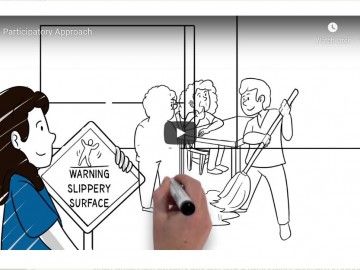
New video looks at participatory ergonomics in long-term care
Front-line staff are the experts when it comes to spotting workplace musculoskeletal disorder (MSD) hazards and proposing solutions. That's the main idea behind an injury prevention approach called "participatory ergonomics." A new video outlines what we learned, thanks to a project with Public Services Health & Safety Association, about implementing this approach in the long-term care sector.

New website offers workplace information on accommodating and communicating about episodic disabilities
Accommodating and Communicating about Episodic Disabilities (ACED), a five-year partnership led by the Institute for Work & Health (IWH), is developing evidence-based workplace resources to support the sustained employment of people with chronic, intermittent and often-invisible disabilities (e.g. depression, arthritis, HIV/AIDs, Crohn’s disease, ulcerative colitis, multiple sclerosis and more). Today, IWH launched a website to share information about the ACED project, the partners involved, and the findings and tools as they become available.

IWH Speaker Series presentation: Trends in depression and anxiety among Canadian labour market participants (2000-2016)
Despite much effort aimed at improving the mental health of Canadians, we still know little about the prevalence of two common mental health conditions across the working population. In an October 22 IWH Speaker Series presentation, Institute Research Associate Kathleen Dobson shares her doctoral research exploring trends in depression and anxiety disorders among working-age Canadians, from 2000 to 2016.

IWH's Nachemson lecture not taking place this year
Wonder why you haven’t heard about this year’s Alf Nachemson Memorial Lecture, hosted by IWH every fall and delivered by a renowned expert in the occupational health and safety (OHS) or disability prevention research and policy arena? You haven’t heard anything because we’re not holding the lecture this year—or next. It’s all hands on deck here at the Institute as we prepare for the XXII World Congress on Safety and Health at Work, taking place in Toronto October 4-7, 2020. We’ll miss seeing you at the Nachemson lecture, but we hope you’re coming to World Congress 2020.

Now hiring: Manager, Knowledge transfer & exchange
The Institute is currently seeking a qualified person to fill the position of Manager, Knowledge Transfer & Exchange. As a member of the Institute’s management team, this person will be responsible for supervising our knowledge transfer activities and direct a team of knowledge transfer associates in building vibrant relations with thought leaders in organized labour, employer communities, health care, occupational health and safety, disability management and regulatory authorities. The deadline for application is October 25, 2019.

Manitoba OHS dashboard lets companies compare themselves with the competition
Ever wonder how your company stacks up against your competitors on occupational health and safety (OHS) performance? Building construction companies in Manitoba can now do just that. Developed by IWH and the Construction Safety Association of Manitoba (CSAM), the INDICATOR dashboard and benchmark lets building construction employers in the province compare themselves against others of the same size, subsector or region on several OHS leading indicators. In a recent At Work article, IWH Senior Scientist Dr. Ben Amick explains how this benchmark stands out from the rest.

Supervisor’s response to work injury matters to return to work: Our latest video
Supervisors are busy. They’re always juggling multiple demands for their time and attention. But that moment when they learn a worker is injured, do they react with concern and empathy or blame and skepticism? As the latest research-based video from the Institute sums up, a supervisor’s response can make a difference to whether an injured worker returns to work successfully within a few months. It’s one of the ways supervisors matter.

IWH’s Dr. Arif Jetha promoted to scientist
Congratulations to Dr. Arif Jetha, who has been promoted from associate scientist to scientist at the Institute. Jetha, who joined IWH in 2015 as a Mustard post-doctoral fellow, focuses his research on life-course differences in the work participation of people living with chronic disabling conditions, with a particular interest in the early labour market experiences of millennial young adults. Details about Jetha’s projects are available on his IWH website bio page.

Topic pages now posted on the IWH website
Looking for research findings and resources on our website about a particular topic? Try our “Selected topics” page. You'll find it under “Our research” on the drop-down menu. From aging to young workers, from cannabis to violence at work, from health care to construction, we might just have the collection of research summaries, journal articles, tools and presentations on your topic of interest.

Link between “newness” and higher injury risk confirmed by systematic review
Workers new to a job, regardless of their age, face higher risks of injury. This workplace health and safety message is based on several studies—including some by the Institute for Work & Health (IWH)—and it has spread far and wide. However, it was only recently that a systematic review on newness and injury risk was carried out. The review, conducted by IWH, confirms a link between newness and the risk of acute injuries—but is inconclusive on the link between newness and the risk of musculoskeletal disorders.

Understanding the types of workplaces that offer both OHS and wellness programs
Research suggests that occupational health and safety (OHS) and health promotion programs provide greater benefits to workers’ overall health when they are integrated within an organization’s health and safety strategy. To learn about the types of workplaces where such integration might be easier to implement, a new IWH study set out to learn the common characteristics of Ontario workplaces that offer both. Findings are now summarized in a new Research Highlights.

The summer 2019 issue of At Work is out
The latest issue of the Institute for Work & Health's quarterly newsletter, At Work, is now out. In the Summer 2019 issue, read about retirement expectations among boomers with chronic conditions, the use of IWH's leading indicators in a health and safety assessment tool built for Manitoba's building construction employers, the economic case for raising worker awareness about caregiving supports, and more.

What research can do: IWH research helps prevention system shift focus from young to new workers
You know research has had an impact when it changes the language used to frame an issue, and the findings become so ubiquitous they are considered part of the “common wisdom.” That seems to be the case with IWH’s research on injury risks and new workers.

IWH Updates - Summer 2019
IWH’s Dr. Arif Jetha receives federal grant for innovative research ~ New project to examine financial incentives to encourage the hiring of people with disabilities ~ Call for abstracts for World Congress 2020 soon to come